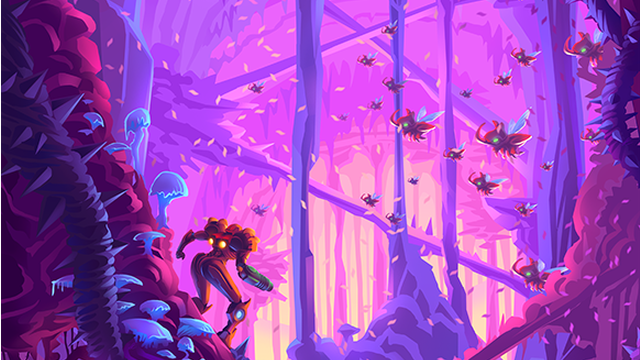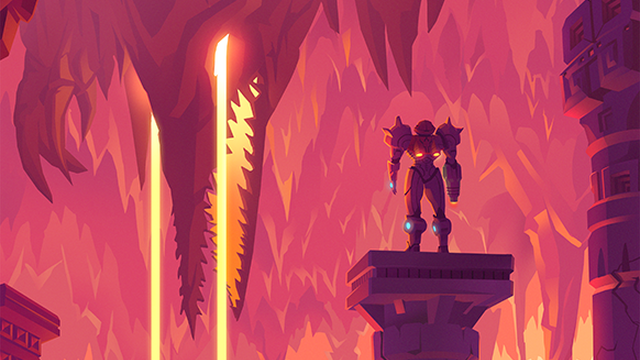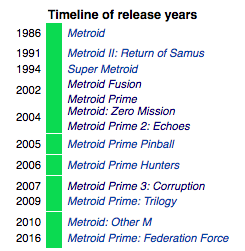Nintendo is one of the most famed video game developers and publishers in the world. And the company only got that way by having a strong stable of historically great and influential IPs. For every Mario and Zelda that garners a ton of attention, there’s a Star Fox or Kid Icarus. It is in this latter category that we find one of Nintendo’s most historically influential IPs: Metroid.
Previously I’ve talked about how Capcom has mistreated Mega Man in recent years, both by slapping us in the face with an unwanted cartoon and by neglecting to release new games in the series. I’ve also talked about how Konami has mistreated the Castlevania series in the last few years. However, you wouldn’t know it, given their wanton disregard for these series in recent memory, series that were once the cornerstones of their respective publishers’ business strategies.
If you look back at the GBA era, you will find an embarrassment of riches for the Mega Man franchise. Similarly, Konami strongly supported the GBA and DS with two separate trios of great games that were in the same vein as Symphony of the Night. But this was never the case for Metroid. Looking over the timeline of the series’ history reveals a drought of titles in spite of the quality and success the franchise has often celebrated.
However, before we do that we must establish that this is a symbiotic relationship; the Switch needs Metroid just as much as Metroid needs the Switch. This is thanks to the fact that, behind Legend of Zelda: Breath of the Wild, there aren’t many titles available for the Switch– exclusive or otherwise.
 Image courtesy of François Coutu.
Image courtesy of François Coutu.
This is even more important thanks to the fact that Nintendo is no longer in sync with the cycles established by Sony and Microsoft. One of the big reasons that the Wii U failed was that it wasn’t a significant upgrade over its competitors while being more expensive and having a significantly smaller library; something that the Switch also suffers from. While the Switch was not released as far into the PS4 and Xbox One life cycles as the Wii U was with the PS3 and Xbox 360, it’s still three years and hundreds of titles behind the curve.
Obtained from Wikipedia.
There has been no shortage of great games from Nintendo in recent years. Excellent new IPs like Splatoon have popped up and gotten sequels. Meanwhile, older IPs have been given the chance to redefine themselves and truly shine, like Fire Emblem (which only recently received a new entry), or The Legend of Zelda (whose most recent entries have all bucked long-held trends in favor of experimentation and innovation).
But the only two Metroid games released since 2007’s Metroid Prime 3: Corruption were Metroid: Other M in 2010 and Metroid Prime: Federation Force in 2016. The former was an action game that tried and failed to revitalize the series. The latter was an online multiplayer FPS that had nothing in common with the Metroid series except for its name. After 30 years, there have only been 11 entries in the series (not counting a pinball game and a Prime collection for the Wii).
Federation Force Made Fans Look Favorably at Other M.
To understand exactly how much of a travesty Nintendo’s treatment of our titular Samus has been over the years, we need to put things into perspective. And there is perhaps no better way to do this than looking at the third entry in the series: Super Metroid.
At the time of its release, the series was already about eight years old. Keep in mind, this was in a day and age when publishers were generally pumping out sequels on an annual or biannual schedule. While Nintendo isn’t your average publisher, this slow approach holds true over the course of the series.
But this is neither here nor there because Super Metroid revolutionized video games. Its design was sleek and simple, yet complex and deep. The game’s quiet, somber — yet alien — world, combined with a stellar soundtrack, served to create an atmosphere that set a new bar for what people knew could be achieved through video games. Its controls were intuitive and tight.
Oh, and it helped pioneer its own subgenre — which Castlevania: Symphony of the Night would later cement — Metroidvania. This formula centers around players exploring a world that slowly becomes more and more open as they earn new gear or abilities that let them reach new areas, thus making previously inaccessible areas accessible.
We’ve seen this used and bastardized so much in modern times that we take it for granted. But in Super Metroid, you didn’t merely unlock items that allowed you to backtrack to previously barred-off locations. Instead, many of the items allowed you to navigate the world in completely different ways, like using the ice beam to freeze enemies, which then let you use them as platforms. In fact, Super Metroid has become infamous for all of the complex ability interweaving that lets you complete the game in myriad ways — some the developers had never intended.
In spite of this, however, the game doesn’t break. Instead, its design masterfully withstands some of the deadliest challengers around, namely, players and time itself.
Super Metroid didn’t just revolutionize the industry …
It’s still the golden standard for its genre today.
But should this treatment really come as a surprise in retrospect? After Super Metroid’s 1994 release, we saw an eight-year hiatus for the series. Meanwhile, looking at releases following Mega Man 2 or Castlevania: Symphony of the Night — those series’ respective groundbreaking titles — reveals dedication to these key franchises after revolutionizing the industry. Finally, in 2002, Nintendo brought us the great Metroid Fusion and Metroid Prime games.

Metroid Prime would be the series’ first foray into the realm of 3D. This was a full six years after Super Mario 64 and four years after Legend of Zelda: Ocarina of Time, Mega Man Legends, and Castlevania 64, which all saw their respective series branch out into the third dimension successfully (Mario and Zelda), prosaically (Mega Man), and horrifically (Castlevania). That’s right, a full console generation after we were capable of pulling off 3D, Nintendo finally decided to make a 3D Metroid. We saw this repeat again last generation, as the Wii U — like the Nintendo 64 before it — also saw Nintendo skipping out on new Metroid titles.
Despite the Wait for and Expectations of a First-Person Metroid, the Metroid Prime Trilogy Delivered.
Metroid Prime joined a long line of titles before and after that proved that Nintendo was willing to take creative risks on series. Sometimes it pays off, like with the Metroid Prime trilogy, and sometimes it doesn’t, like with Metroid: Other M. But it’s precisely because of their propensity to innovate and challenge norms that it’s been so surprising to see them push one of their most innovative series to the backburner. Does anyone really doubt Nintendo’s ability to make another great entry in this series, whether it be 2D, 3D, or even something new like VR?
If you didn’t already understand what makes Metroid great and the hardships of their fan base, then perhaps you now do. We need a new Metroid on the Nintendo Switch because we need to see a return to form for Metroid. We need a new Metroid because Metroid is as historically great as much as it is currently relevant. Because this series is underserved as much as the Switch itself in its infancy is also underserved. Because we need a new, genuine Metroid title just as much as we want genuinely good games.
So heed our call, Nintendo, and Make Metroid Great Again!








Published: Jun 2, 2017 03:21 am